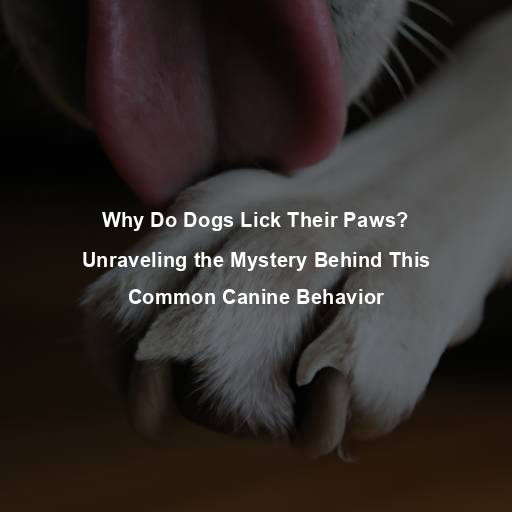Do Dogs Know When You Are Sick?
Last Updated on November 7, 2023 by Evan
Contents [hide]
- 1 Exploring the Extraordinary Bond Between Dogs and Humans
- 1.1 Canines: Masters of Observation
- 1.2 Unleashing the Power of Scent
- 1.3 The Power of Empathy
- 1.4 A Scientific Perspective
- 1.5 The Human-Dog Connection
- 1.6 The Power of Emotional Support
- 1.7 The Limitations of Canine Perception
- 1.8 The Enigmatic Connection
- 1.9 The Power of Olfaction
- 1.10 Training Dogs as Medical Detectives
- 1.11 Exploring the Chemical Changes
- 1.12 The Role of Behavioral Cues
- 1.13 Emotional Contagion: Sharing Our Feelings
- 1.14 Individual Variations in Sensitivity
- 1.15 The Power of the Bond
- 1.16 The Therapeutic Benefits
- 1.17 A Heartwarming Connection
- 2 FAQs: Do Dogs Know When You Are Sick
Exploring the Extraordinary Bond Between Dogs and Humans
Throughout history, dogs have always held a special place in our hearts, offering a comforting presence that is hard to put into words. They possess an extraordinary ability to transcend the boundaries of language and connect with us on an instinctual level. But what if there is more to their empathy than meets the eye? Countless anecdotes from pet owners suggest that dogs possess an uncanny knack for sensing when something is awry within their human companions.
Canines: Masters of Observation
When it comes to perceiving the world around them, dogs are truly extraordinary creatures. Their heightened sense of smell, hearing, and intuition grants them a mysterious ability to tune in to even the subtlest of changes in their environment. They possess an uncanny knack for observing human behavior, picking up on intricacies that often elude the average onlooker. In the realm of health, their remarkable senses come to the forefront, allowing them to detect the faintest shifts in body odor, perspiration, and even the tiniest nuances in facial expressions.
Unleashing the Power of Scent
One of the remarkable features of dogs is their olfactory prowess. It is widely known that dogs have an extraordinary sense of smell, far superior to that of humans. They have up to 300 million scent receptors in their noses, compared to our mere 6 million. This incredible olfactory system allows them to detect minute chemical changes in the human body, including those associated with illness.
It’s astounding how dogs, our beloved companions, hold the remarkable power to detect intricate medical conditions that afflict us humans. Recent studies have uncovered that these loyal creatures can be trained to sniff out specific illnesses, like cancer, diabetes, and epileptic seizures, based on the volatile organic compounds emitted by our bodies. Remarkably, these compounds can surface as subtle shifts in breath, sweat, or even urine. By employing dogs in medical settings, healthcare professionals can now rely on their extraordinary abilities to alert them to these ailments, often outpacing conventional diagnostic means.
The Power of Empathy
Beyond their extraordinary sense of smell, dogs are known for their empathetic nature. They have an uncanny ability to pick up on human emotions, providing comfort and support in times of distress. This empathetic connection may extend to detecting when their owners are unwell.
There is an ocean of enchanting tales surrounding our beloved furry friends that add a mesmerizing layer to the depths of their loyalty and empathy. Unfathomable accounts reveal that dogs, in their magnificent wisdom, unleash a torrent of perplexing behaviors when their human counterparts fall ill. Struck by an inexplicable surge of devotion, these noble creatures refuse to abandon their ailing companions, choosing instead to shower them with tender affection or showcase signs of distress that echo their human’s suffering. The most astonishing of all is their uncanny ability to intuitively identify the exact regions that warrant soothing, as they delicately nudge and lick areas that bear the weight of illness.
A Scientific Perspective
While anecdotal evidence is compelling, the scientific community is still exploring the extent to which dogs can detect illness in humans. Some researchers believe that dogs can indeed sense changes in body odor, which may occur during certain illnesses. These changes could be attributed to the release of specific chemicals or shifts in the body’s metabolic processes.
However, it is important to note that not all studies have yielded consistent results. Some research suggests that dogs may be more adept at detecting certain illnesses, such as cancer, while being less accurate in detecting others. Additionally, the ability to detect illness may vary among individual dogs, with some displaying a stronger inclination than others.
The Human-Dog Connection
The connection between humans and our canine companions is something truly extraordinary and deeply complex. It’s a remarkable relationship that has blossomed and transformed over countless millennia. From the ancient times of domestication to the present day, dogs have undergone a remarkable evolution, attuning themselves to our every nuance and emotion. This extraordinary bond is built on a foundation of trust, unwavering companionship, and an undying, unconditional love.
There’s something truly fascinating about the way our four-legged friends seem to have an uncanny ability to detect when something is amiss with their owners. It’s almost as if they have a sixth sense, finely tuned to the subtlest shifts in our well-being. Perhaps it’s their acute powers of observation, paired with their remarkable capacity for empathy, that grants them this remarkable ability to pick up on even the slightest changes in our demeanor and health. It’s a captivating phenomenon that leaves us both in awe and pondering the mysteries of the deep bond shared between humans and dogs.
The Power of Emotional Support
In a world full of mysteries, dogs have emerged as unexpected heroes, not just for their uncanny ability to sniff out illness, but also for their unparalleled gift of emotional support. Countless scientific endeavors have unveiled the profound impact that these four-legged companions have on our mental and physical wellness. The mere presence of a dog can work wonders, alleviating the burdens of stress, calming turbulent waters within our bodies, and igniting a radiant sense of happiness and contentment in our hearts. Let us delve into the extraordinary realm of canine-human connection and uncover the bewildering secrets of their healing magic.
For individuals facing health challenges, having a furry companion by their side can provide comfort and alleviate feelings of loneliness. The unconditional love and unwavering loyalty of a dog can be a source of solace during difficult times, serving as a much-needed emotional anchor.
The Limitations of Canine Perception
We cannot deny the incredible talents our furry companions possess, but let’s not forget their boundaries. They shouldn’t be viewed as flawless medical experts, replacing the advice of trained professionals. If you’re feeling under the weather, seeking the expertise of a healthcare professional is always the wisest choice for an accurate diagnosis and customized treatment.
Additionally, it is crucial to rule out other factors that may influence a dog’s behavior. Dogs are highly attuned to their owners’ routines and can pick up on subtle changes in their daily lives. It is possible that alterations in routine or behavior due to illness may trigger a response from the dog, rather than their ability to detect the illness itself.
The Enigmatic Connection
The bond between dogs and humans remains an enigma, filled with wonder and endless possibilities. While the question of whether dogs can truly sense when their owners are sick may not have a definitive answer, the experiences shared by countless pet owners cannot be dismissed. Whether it is their extraordinary sense of smell, their empathetic nature, or simply the power of an unbreakable bond, dogs continue to captivate our hearts and minds.
In the realm of dogs and their uncanny ability to detect illness, there is still much to unravel. As we continue to explore the depths of this extraordinary bond, let us celebrate the incredible companionship and unwavering devotion that dogs bring into our lives. For in their presence, we find solace, joy, and a love that knows no bounds. ## The Science Behind Canine Detection Abilities
The Power of Olfaction
Have you ever wondered what makes dogs’ sense of smell so extraordinary? Well, it turns out that their snouts are more than just adorable features – they actually play a vital role in their super sniffing abilities. These furry detectives possess a specialized structure known as the vomeronasal organ (or Jacobson’s organ, for those in the know), which acts as their very own chemical analysis laboratory. Alongside their spacious nasal cavities and sophisticated olfactory receptors, this remarkable combination allows dogs to navigate the world of scents with an unmatched level of precision and sensitivity.
Training Dogs as Medical Detectives
Due to their remarkable olfactory abilities, dogs have been trained to detect various medical conditions. In some cases, they have shown remarkable accuracy in identifying specific diseases, such as certain types of cancer or infections. By utilizing their keen sense of smell, dogs can potentially assist in early disease detection, leading to more effective treatments and improved outcomes.
Exploring the Chemical Changes
Emerging studies indicate a mind-boggling possibility – our furry companions might possess an astonishing ability to sniff out subtle shifts in our bodily fragrances caused by ailments. Intriguingly, when certain diseases wreak havoc on our systems, they trigger a cosmic cascade of metabolic transformations. Consequently, this celestial symphony of changes leads to the emission of curious volatile organic compounds (VOCs) that manifest themselves in our breath, sweat, or even urine. Mind you, dogs, enchanting creatures that they are, possess an enigmatic talent to sense these extraordinary odor compositions, potentially serving as unexpected sentinels, alerting their humans to hidden maladies lurking within.
The Role of Behavioral Cues
It’s truly fascinating how dogs possess this uncanny ability to combine their incredible sense of smell with their keen observation of human behavior. They pick up on a wide range of signals, from our body language to the tone of our voices, allowing them to detect even the most subtle indications of potential illness. It’s this unparalleled synergy between their olfactory prowess and their astute perception of our overall demeanor that makes dogs such remarkable companions and invaluable helpers in various fields. They truly are our loyal sentinels, always on the alert for any perplexing changes in our well-being.
Dogs possess a remarkable ability to pick up on subtle hints when it comes to their owners’ well-being. They notice the slightest variations in their pace, noting unusual tiredness or alterations in appetite and sleep habits. Armed with their astute observation skills, these four-legged detectives have an uncanny knack for deciphering signs of their humans’ ailments.
Emotional Contagion: Sharing Our Feelings
It’s no secret that dogs are masters at tuning into their owners’ emotions. This intriguing phenomenon called emotional contagion packs a powerful punch, enabling our furry friends to tap into our moods and reflect them right back at us. Whether we’re feeling under the weather or experiencing a state of unease, dogs have an uncanny ability to pick up on the subtle signals we emit and respond with an amplified dose of love and attention. It’s a fascinating dance of connection that keeps us marveling at the depth of their perceptiveness.
Individual Variations in Sensitivity
When it comes to dogs and their remarkable ability to detect illness, it’s vital to understand that not every canine is created equal. Just as us humans vary in our senses and perceptions, our furry friends also exhibit a range of aptitudes for recognizing health issues. Breed, training, and even individual temperament all play a role in shaping a dog’s keenness in picking up on those subtle shifts in their owner’s well-being. The mysteries behind these variations continue to intrigue and perplex researchers and dog lovers alike.
The Power of the Bond
The fascinating relationship between dogs and humans is a perplexing dance of trust, affection, and intricate communication. Throughout centuries of coevolution and companionship, dogs have seamlessly adapted to our ever-changing needs, displaying an uncanny ability to read our emotions and discern our intentions. This intricate interplay has woven a tapestry of undeniable connection, where both species rely on and understand each other in ways that leave us in awe.
The strength of this bond may contribute to dogs’ ability to detect when their owners are sick. Their intuitive understanding of human emotions and their unwavering loyalty can create a profound connection that enables them to provide comfort and support during times of illness or distress.
The Therapeutic Benefits
The fascinating world of dogs never ceases to amaze us, as their potential to sniff out illness in humans unfolds before our eyes. While scientists continue to unravel this mysterious skill, we mustn’t overlook the already proven and remarkable therapeutic benefits these four-legged wonders bring. In therapy settings, dogs have been hailed as miraculous companions, lending a paw to individuals grappling with an array of physical and mental health challenges. The mere presence of these furry angels has a miraculous ability to pacify unrest, dissolving stress and anxiety like gentle bubbles dancing on water.
Living with chronic illness or undergoing intensive medical treatments can be an incredibly challenging journey. However, the presence of a canine companion has been shown to provide a remarkable source of solace and encouragement. The indescribable bond between humans and dogs offers a unique form of emotional support that can uplift spirits, instill a newfound sense of purpose, and ultimately lead to enhanced treatment outcomes.
A Heartwarming Connection
The age-old query regarding canine intuition and their ability to discern their owners’ ailments may forever remain shrouded in enigma. However, the multitude of anecdotes shared by devoted pet parents serves as a testament to the unfathomable connection forged between humans and their furry companions. This inexplicable bond, defying the confines of comprehension, never fails to leave us spellbound and filled with an insatiable curiosity.
Whether dogs possess a sixth sense for detecting illness or rely on their acute senses and empathetic nature, their presence during times of sickness can bring immense comfort and solace. The loyalty, love, and unwavering support they provide serve as a reminder of the incredible connection we share with these remarkable creatures.
As we navigate the mysteries of this profound relationship, let us cherish and celebrate the remarkable bond we have with our canine companions. In sickness and in health, dogs are there for us, offering their unwavering loyalty and unconditional love.
FAQs: Do Dogs Know When You Are Sick
Can dogs sense when their owners are sick?
Without a doubt, dogs possess an extraordinary knack for detecting when their beloved owners are not feeling their best. Their olfactory prowess is truly a thing of wonder, as they can sniff out subtle shifts in the chemical makeup emanating from a sick human body. Moreover, these perceptive canines are attuned to the slightest alterations in their owner’s demeanor – from changes in body language to the tone of their voice – all telling signs of potential ailments. The remarkable bond between dogs and their humans is often showcased through heartwarming tales of dogs sounding the alarm, alerting their owners to underlying health concerns.
How do dogs react when their owners are sick?
When it comes to our furry companions, the way they respond to our illness is truly fascinating. It’s as if they have an uncanny ability to sense when we’re not at our best. Each dog has its own distinct personality, which means their reactions can vary greatly. Some dogs might become incredibly attentive, showering their sick owners with love and care, never leaving their side. Others may opt for a more soothing approach, gently laying their head on their owner’s lap or snuggling up close to offer emotional support. And let’s not forget those adorable doggy kisses and gentle nudges to the affected areas, as if to say, “I’m here for you, always.”
Can dogs detect specific illnesses or medical conditions?
While dogs have been known to pick up on general signs of illness, there is also evidence suggesting that certain dogs can detect specific illnesses or medical conditions. Trained medical detection dogs, for example, have been used to detect diseases such as cancer, diabetes, and even epileptic seizures. These exceptional dogs undergo rigorous training to identify specific odors associated with various diseases, allowing them to alert their owners or healthcare professionals when they detect those scents. However, it is important to note that such specialized abilities are typically found in dogs who have received specific training and not all dogs possess this particular skill.
Why do dogs show empathy towards their sick owners?
Dogs possess an inexplicable loyalty and boundless compassion that perplexes even the most astute observers. It’s as if they have an intrinsic understanding of their owners’ well-being, effortlessly detecting subtle shifts in emotions and health. Through centuries of coexistence, the canine species has evolved a remarkable skill in deciphering human cues, enabling them to react with remarkable sensitivity. Moreover, their innate inclination to seek solace and reassure has bestowed upon them the remarkable ability to display empathy towards their sickly human companions, offering an invaluable source of comfort during arduous times.
Can dogs transmit illnesses to their owners when their owners are sick?
While it is rare, there is a possibility that dogs can transmit certain illnesses to their owners when their owners are sick. Some bacterial or viral infections, such as certain types of influenza or gastrointestinal illnesses, can be zoonotic, meaning they can be passed from animals to humans. Therefore, it is important to maintain proper hygiene practices, such as washing hands thoroughly after handling a sick dog or avoiding close contact if deemed necessary by a healthcare professional. In most cases, with basic precautions and good hygiene, the risk of transmission of common illnesses between dogs and their owners is relatively low.







